|
|
|
Sort Order |
|
|
|
Items / Page
|
|
|
|
|
|
|
| Srl | Item |
| 1 |
ID:
114151
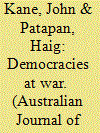

|
|
|
| 2 |
ID:
114153
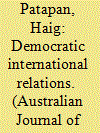

|
|
|
|
|
| Publication |
2012.
|
| Summary/Abstract |
The article examines the extent to which Montesquieu's doux commerce thesis, which claims that commerce leads to softening of manners and therefore favours international peace, presents a challenge to democratic peace theory. It argues that Montesquieu's claim that peace may be due to commerce, and not democracy, provides a theoretical challenge to those scholars who argue that there is a Kantian virtuous triangle of democracy. The practical implication of this theoretical challenge concerns the way democratic peace theory has influenced the practice of international politics, especially American foreign policy. The article argues that Montesquieu's doux commerce thesis mediates between the contending claims of realism and liberal internationalism over the merits of democratisation as an essential means for securing peace.
|
|
|
|
|
|
|
|
|
|
|
|
|
|
|
|
| 3 |
ID:
169961
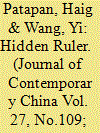

|
|
|
|
|
| Summary/Abstract |
The article provides the first comprehensive examination of the life and thought of Wang Huning, member of the Politburo, advisor to three Chinese leaders and important contributor to major political conceptual formulations in contemporary China. In doing so, it seeks to derive insights into the role of intellectuals in China, and what this says about Chinese politics. It argues that, although initially reluctant to enter politics, Wang has become in effect a ‘hidden leader’, exercising far-reaching influence on the nature of Chinese politics, thereby revealing the fundamental tensions in contemporary Chinese politics, shaped by major political debates concerning stability, economic growth and legitimacy.
|
|
|
|
|
|
|
|
|
|
|
|
|
|
|
|
| 4 |
ID:
085003
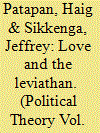

|
|
|
|
|
| Publication |
2008.
|
| Summary/Abstract |
Hobbes's understanding of love, and its significance for his political thought, has received insufficient attention. This essay contends that Hobbes has a consistent and comprehensive teaching on love that directly repudiates what he regards as the Platonic teaching on eros. In attacking the Platonic idea of eros, Hobbes undermines a pillar of classical political philosophy and articulates a significant aspect of his new understanding of the passions in terms of power, which is itself a critical part of his new political science most famously presented in Leviathan
|
|
|
|
|
|
|
|
|
|
|
|
|
|
|
|
| 5 |
ID:
085338
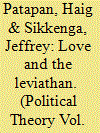

|
|
|
|
|
| Publication |
2008.
|
| Summary/Abstract |
Hobbes's understanding of love, and its significance for his political thought, has received insufficient attention. This essay contends that Hobbes has a consistent and comprehensive teaching on love that directly repudiates what he regards as the Platonic teaching on eros. In attacking the Platonic idea of eros, Hobbes undermines a pillar of classical political philosophy and articulates a significant aspect of his new understanding of the passions in terms of power, which is itself a critical part of his new political science most famously presented in Leviathan.
|
|
|
|
|
|
|
|
|
|
|
|
|
|
|
|
| 6 |
ID:
116809
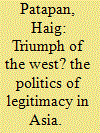

|
|
|
|
|
| Publication |
2012.
|
| Summary/Abstract |
The rise of China has led some commentators to claim that Asia will dominate the twenty-first century. In this article the author argues that, to the extent that countries in the region define and understand their politics in Western terms, the rise of Asia will simply continue the influence of modernity that had its origins in the West. In order to demonstrate this case, the author examines the character of political legitimacy in the region, which is founded on the concept of the state, an idea derived from the West. The modern state form has provided considerable advantages to countries in the region, bestowing international legitimacy on those that claim sovereignty, endowing smaller nations with increased political power in international negotiations, and allowing states to use the idea of non-intervention to shield themselves from international scrutiny. But the concept of the state has also defined new territorial boundaries superimposed on pre-existing political, ethnic and traditional sources of power, thereby creating new problems of legitimacy. In confronting and negotiating these challenges, Asian states have resorted to Western concepts of legitimacy, including democracy, nationalism and performance. Thus, an examination of the politics of legitimacy in Asia reveals the extent to which countries in the region are fundamentally shaped in their architecture of governance and their conception of legitimacy by Western ideas. The success of Asia in the twenty-first century will therefore not introduce a new type of 'Asian' global politics, or restore a more ancient kind, but simply confirm the dominance of modernity in shaping thought and practice.
|
|
|
|
|
|
|
|
|
|
|
|
|
|
|
|
|
|
|
|
|